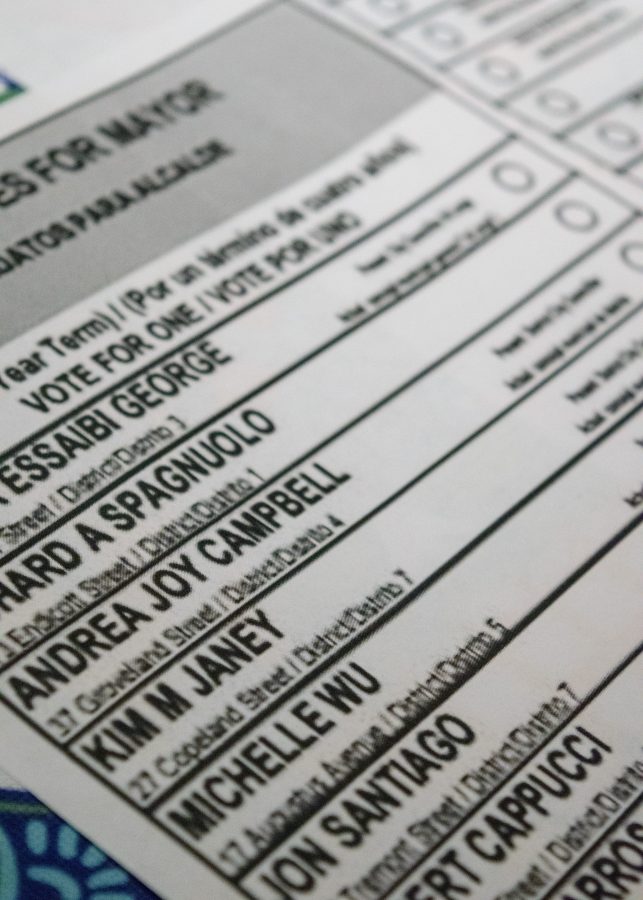In a few short weeks, Boston city residents will head to the polls to cast their votes for Boston city mayor. Following the primary election, two candidates made it to the general election. City Councilor Michelle Wu is up against her colleague, City Councilor Annissa Essaibi George. As these two candidates face off for the top political job in the City of Boston, Boston residents are anxious to see who will be named the winner. This election is particularly unique considering the factors that have swarmed the city these past few months.
First, it is important to know the current mayor of Boston was not elected. Acting Mayor Kim Janey was appointed following former Mayor Marty Walsh’s appointment as Secretary of Labor to President Biden’s cabinet. Although she was Boston’s first Black mayor, she was unable to run a successful campaign and did not make it past the primary election. Her general unpopularity means that the City of Boston must continue to wait for its first elected Black mayor.
Although this general election does include a Republican running, based on historic Boston voting trends, it can safely be assumed that the next mayor of Boston will be either Michelle Wu or Annissa Essaibi George. This race has been long and drawn out and Bostonians from Hyde Park, to Dorchester, to Southie are looking forward to a new mayor.
Both candidates have strong reputations and both have a large group of supporters behind them. Michelle Wu has served in the Boston City council since 2013, when she was elected at the age of 28. According to NBC Boston, “Wu’s parents emigrated to the United States from Taiwan in the early 80s, before she was born. She is fluent in Mandarin and Spanish.” (1)
Annissa Essaibi George has been a high school teacher in Boston for many years and was elected Boston City Councilor-at-Large in 2013. According to NBC Boston, “Starting in 2001, Essaibi George taught Economics, Business Management and Health & Human Services to juniors and seniors at East Boston High School. She also served as the assistant softball coach.” (2) This election has been long, with both candidates engaging in several debates throughout the election cycle.
The most recent debate was last week. You can find the recording here https://www.nbcboston.com/news/politics/watch-wu-and-essaibi-george-square-off-in-boston-mayoral-debate/2525699/. For those who are not caught up on the candidates, watching televised political debates can give you a great deal of insight in a short amount of time. The average voter often does not have time to carefully research and analyze each candidate and their policy goals. Although debates are often filled with rehearsed lines, empty statements, hollow gestures and candidates outwardly dodging questions, watching debates can give you some more intriguing insights into things such as the body language and demeanor of each candidate.
One of Michelle Wu’s most popular policy goals is to make the MBTA free for all Boston residents. Her website reads, “There is no time left to delay in addressing climate change and income inequality. Instead of fare hikes, we should be discussing bold ideas to invest in transit—bold ideas like a fare free transit system.” (3) Many Boston residents find this prospect particularly intriguing as many residents rely on the MBTA for daily transportation needs. From the subway, to the bus system, to the commuter rail, Boston residents and residents of the Boston Metro area heavily rely on the services provided by the MBTA. Michelle Wu’s ambitious plan has garnered her a lot of support, particularly from low-income families. If she was elected, she would become the first elected female mayor and the first Asian mayor in the history of the city of Boston.
Annissa Essaibi George has a specific focus on climate reform. Her website reads, “As Mayor of Boston, Annissa will lead on climate action with a community-based approach to ensure each and every resident in every neighborhood has the opportunity to shape the policy and initiatives to tackle climate change and environmental injustice. Annissa knows that too many conversations surrounding climate policy neglected to address the real, everyday environmental injustices that disproportionately impact our communities of color and low-income communities.” (4) Her focus on climate reform makes her a very popular candidate for many environmental activists.
Michelle Wu’s impressive lead in the polls and Essabi George’s somewhat underwhelming campaign suggest that Boston residents may soon elect Michelle Wu as their next mayor. According to Boston 25 News, “Wu led Essaibi George 62 percent to 30 percent in the Suffolk University poll of likely voters taken for the Boston Globe and NBC10.” (5) As Boston city residents head to the poll in a few weeks, it is important to get to know the candidates. Please do your own research and be informed. That way, you can be an informed, educated voter.

